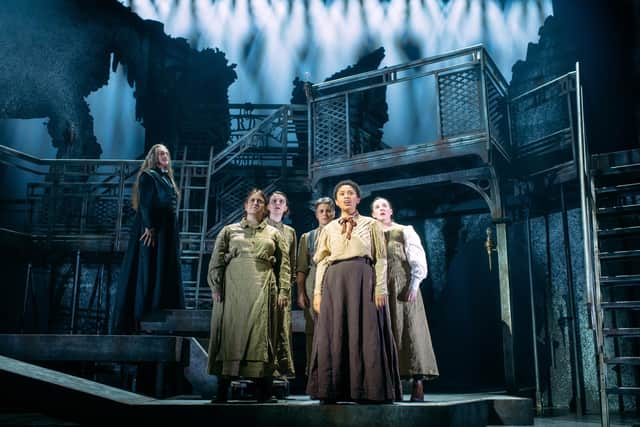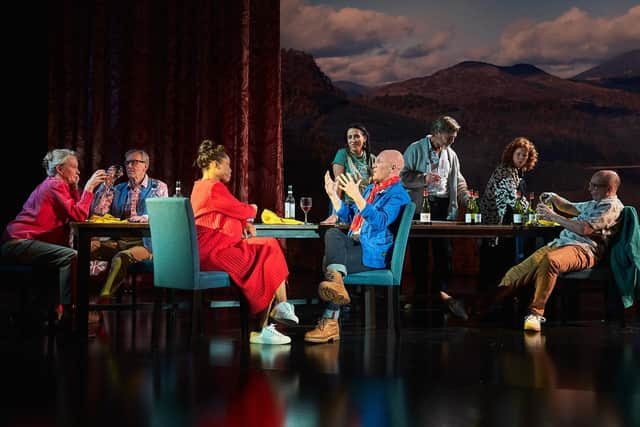Arts review of 2023: Joyce McMillan on the year in theatre
Arts companies are in the business of putting on a good show. It’s what they do, even in tough times; and despite all the current pressures on artists and organisations, they tend to do it well.
It’s a gift, though, that is increasingly used against them, particularly in the UK, where after 15 years of ever deeper “austerity”, the publicly-supported cultural sector is now struggling to retain talent, and paper over the financial cracks; and 2023 was the year when major elements of the Scottish theatre scene – notably our big building-based producing theatres – began to fear complete collapse, as the long-term impacts of the Covid pandemic and the soaring inflation crisis hit home.
Advertisement
Hide AdIn Glasgow, for example, the Citizens’ Theatre remains closed and dark, five years after the start of a rebuilding programme that has been dogged by soaring costs and supply chain problems. The Lyceum in Edinburgh can no longer produce main stage shows alone, although its programme of co-productions this year has produced a series of gems, from Zinnie Harris’s Macbeth: An Undoing, to the beautiful and hugely moving Castle Lennox (written by Linda McLean for a tremendous Lung Ha company), and Peter Arnott’s Group Portrait in a Summer Landscape, co-produced with Pitlochry, a fascinating first effort at a main stage play about Scotland’s referendum summer of 2014.


The Tron in Glasgow had a magnificent year, opening with a searingly brilliant Scottish premier by Andy Arnold of David Ireland’s electrifying Belfast drama Cyprus Avenue, starring David Hayman. It produced or co-produced the gorgeous Ramesh Meyyappan/Vanishing Point co-production Love Beyond, Maryam Hamidi’s debut full-length play Moonset, and Gary McNair’s powerful new take on Dickens, Nae Expectations. It also, though, inexplicably, lost all of its Glasgow City Council funding; and in November, its legendary artistic director Andy Arnold stepped down, after more than 40 years directing building-based companies in Scotland, at Edinburgh Theatre Workshop, the Arches and the Tron.
Elsewhere, the building-based companies that bucked the pressures of decline were those with slightly unusual operating models. Pitlochry Festival Theatre, never as heavily dependent on public funding as other Scottish theatres, delivered a year of fine work under Elizabeth Newman’s inspired leadership, including a thrilling and beautiful five-star production of Tennessee Williams’s A Streetcar Named Desire, and a superb Christmas revival of its 2022 production of Stephen Greenhorn’s joyful Proclaimers musical Sunshine On Leith.
At Oran Mor in Glasgow, the late David MacLennan’s Play, Pie And Pint lunchtime theatre model continues to go from strength to strength, producing over 30 new short plays a year under artistic director Jemima Levick, and this year delivering some outstanding shows including Douglas Maxwell’s brilliantly-written firestorm of a two-hander, The Sheriff Of Kalamaki, and the eccentric but wildly popular Noisemaker musical Scots!, a left-field study of Scottish history seen through the eyes of the nation’s most ancient toilet.
The quest for the great Scottish musical was one of the recurring themes of the theatre year, with half-a-dozen mini-musicals premiering at Oran Mor. Among this year’s musical successes were Andy McGregor’s Battery Park – an autumn touring show about the rise and fall of a Greenock-based indie band – and the Fringe smash hit Gunter, by Edinburgh-based women’s company Dirty Hare, a chilling and brilliant play with songs about the gender politics of a 17th century English witch trial.


Perth Theatre, Ayr Gaiety and Cumbernauld Theatre also combined to support a hugely popular touring revival of Ann Marie Di Mambro’s 30-year-old play Tally’s Blood, about the mid-20th-century Italian community in Scotland. The National Theatre of Scotland scored major touring successes in 2023 with Gary McNair’s gorgeous love letter to Billy Connolly, Dear Billy, and – in the autumn – with Morna Pearson’s Dracula: Mina’s Reckoning, a spectacular feminist take on the familiar story featuring a fine performance from Danielle Jam as the heroine Mina. And despite all the practical, financial and competitive pressures faced by both organisations, the 2023 Edinburgh Festival and Fringe delivered some utterly thrilling moments, from La Comédie de Genève’s chilling anatomy of xenophobia, Dusk, to unforgettable Fringe shows like the Baxter Theatre of Cape Town’s heart-shaking Life And Times of Michael K.
Advertisement
Hide AdAs organisations and artists make do and mend and continue to produce vital work, though, tensions now ripple through Scottish theatre that can scarcely be resolved without new resources. It is striking how much previously excluded or under-represented groups – women, gay and non-binary people, or those with a disability, who help shape shows like Love Beyond and Castle Lennox – now contribute to the radical energy of the Scottish theatre scene; but with costs and prices soaring, by far the biggest form of exclusion now involves those who simply cannot afford an evening at the theatre, never mind the luxury of a career in it.
For a country with a modern theatre tradition built on the revolutionary work of 7:84 Scotland, or on a Citizens’ Theatre that, in the 1970s, once slashed prices almost to zero, or on the radical working-class brilliance of theatre-makers like the great John Byrne, whose death we mourn this autumn, this economic exclusion is not only indefensible in itself, but creatively dangerous and deadening.
Advertisement
Hide AdSo if the First Minister needs one reason to make good on his fragile promise, delivered this autumn, to double spending on the Scottish performing arts by 2028, it lies in this: that without a new age of investment, the cultural organisations that should be serving us all will increasingly, and inevitably, become rich folks’ playthings, reflecting the concerns of the few, while failing to speak to the many. That is not the kind of cultural life most Scottish artists want, or have ever wanted. And even in grim times, they will continue to fight, to argue and to work for a theatre that speaks to the whole nation and to the world; and that excludes no-one, either as a member of the audience, or as a new theatre-maker, in our unwritten future.